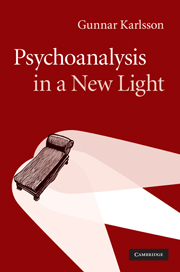Book contents
- Frontmatter
- Contents
- Preface
- Acknowledgements
- List of figures
- 1 Phenomenology and psychoanalysis
- 2 The life-world as the ground for sciences
- 3 A critical examination of neuropsychoanalysis
- 4 The conceptualization of the psychical in psychoanalysis
- 5 The libido as the core of the unconscious
- 6 The grounding of libido in the life-world experience
- 7 Beyond the pleasure principle: the affirmation of existence
- 8 The question of truth claims in psychoanalysis
- Concluding remarks
- References
- Index
8 - The question of truth claims in psychoanalysis
Published online by Cambridge University Press: 05 June 2012
- Frontmatter
- Contents
- Preface
- Acknowledgements
- List of figures
- 1 Phenomenology and psychoanalysis
- 2 The life-world as the ground for sciences
- 3 A critical examination of neuropsychoanalysis
- 4 The conceptualization of the psychical in psychoanalysis
- 5 The libido as the core of the unconscious
- 6 The grounding of libido in the life-world experience
- 7 Beyond the pleasure principle: the affirmation of existence
- 8 The question of truth claims in psychoanalysis
- Concluding remarks
- References
- Index
Summary
In this book I have conceived of psychoanalysis as a science and not merely as a method of treatment. To conceive of psychoanalysis as a science implies that the psychoanalytic project is about searching for truth. The psychoanalytic project of acquiring knowledge of oneself is the same as knowing the truth of oneself. It may appear a pretentious claim, but one should not understand it as if psychoanalysis has a monopoly of what truth about man and human existence is. Instead, psychoanalysis is one of several possible approaches in investigating man and human existential conditions. The unique and special task of psychoanalysis is to bring about knowledge of the unconscious, as well as obscure levels of consciousness, as I have stressed earlier on, in particular in chapter 4. In this chapter, my aim, first of all, is to discuss the psychoanalytic concept of truth and truth claims with respect to the unconscious.
The scientific status of psychoanalysis continues to be a controversial issue in an ever-present debate, and the disagreements between psychoanalysts are significant. One of the reasons that psychoanalysis as a science struggles with difficult epistemological problems is that its subject matter – the unconscious – is constituted in terms of negativity. What other science investigates something that is defined by the prefix un-? The fact that our subject matter presents itself as extraordinarily complex and difficult, does not, of course, render the need for clarification less urgent and compelling.
- Type
- Chapter
- Information
- Psychoanalysis in a New Light , pp. 162 - 190Publisher: Cambridge University PressPrint publication year: 2010



